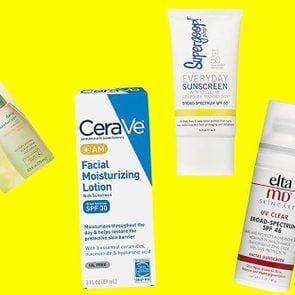The 6 Best Hormone-Safe Sunscreens, Recommended by Doctors
Updated: Oct. 08, 2023

Sun protection with zero chemicals to mess with your system? That's a bright idea. Dermatologists, hormone experts, and a naturopathic doctor list their favorite high-SPF, mineral-based sunscreens—and most are under $20!
Our editors and experts handpick every product we feature. We may earn a commission from your purchases.
According to The American Academy of Dermatology Association (AAD), skin cancer is the most common type of cancer in the US—in fact, one in five Americans will develop skin cancer at some point in their lifetime. So no matter your age, gender, skin type, or other characteristic, applying sunscreen daily is arguably one of the most worthwhile self-care rituals—especially when you consider that daily use of an SPF 15 or higher may reduce the risk of some skin cancers by 40%.
But as we increasingly prioritize sunscreen use and other wellness practices, it’s also come to light that some sunscreens may be safer for you than others when your system absorbs them through your skin and into your bloodstream.
Sunscreen Safety Is Under Fire This Summer—Doctors Share the Facts
Dr. Deena Adimoolam, MD, an endocrinologist and internal medicine specialist, explains to The Healthy @Reader’s Digest: “Certain sunscreens may contain harmful ingredients and endocrine disruptor chemicals (EDCs), such as oxybenzone, octinoxate, parabens, and phthalates. These chemicals, when absorbed in excess and over time, can be linked to several hormone issues.” Dr. Trevor Cates, ND, a naturopathic doctor, says that according to the Endocrine Society, endocrine disruptor chemicals have been associated with fertility issues, early breast development, breast cancer, prostate cancer, thyroid disease, neuroendocrine problems, obesity, and cardiovascular disease.
Dr. Rosia Parrish, ND, a naturopathic doctor and functional medicine practitioner with the Naturopathic Wellness Center of Boulder in Colorado suggests some sunscreen ingredients to consider avoiding are avobenzone, octisalate, octocrylene, homosalate, and Retinyl Palmitate (which can reportedly enhance skin cancer lesions), as well as synthetic ingredients such as PEG, dimethicone, and phenoxyethanol. Dr. Parrish adds that people who are particularly sensitive to hormonal changes or have conditions such as polycystic ovarian syndrome (PCOS) or endometriosis should pay extra attention to whether their sunscreen contains hormone-disrupting ingredients.
‘What SPF Do I Need?’ Here’s a Dermatologist’s Reliable Method for Choosing
In any case, of course, you still need to protect your skin—while ideally also caring for your endocrine system, which you might think of as the air traffic control center that regulates the release of hormones.
Hormone-safe sunscreens are typically mineral-based, with either zinc oxide or titanium dioxide as the active ingredient, sometimes combined with antioxidant-rich botanicals. Mineral-based sunscreens also tend to be free of harmful chemicals that can mess with your hormones or other systems of your body.
4 Unexpected Body Parts That Are Musts for Sunscreen, Says Research
What to look for in a hormone-safe sunscreen
As with just about any product you buy off the shelves, including packaged groceries, it’s wise to read the ingredients list to ensure it’s free from potentially harmful chemicals. Look for mineral-based products with zinc oxide or titanium dioxide as the active ingredient. These ingredients aren’t absorbed into the skin like chemical sunscreens, and they tend to be more soothing to sensitive skin.
Dr. Janiene Luke, MD, FAAD, a board-certified dermatologist and associate professor, tells The Healthy: “I recommend looking for a sunscreen that is SPF 30 or higher, broad-spectrum that you reapply every two hours, and is water-resistant if you’ll be in or around water. You can always look for the formulation that works best with your skin type or your preference when deciding if mineral- or chemical-based is best for you.”
“What SPF Do I Need?” Here’s a Dermatologist’s Reliable Method for Choosing
The best hormone-safe sunscreens
Check out these expert-recommended mineral-based sunscreens if you’re looking to protect your health when you’re enjoying time and activity outdoors.
Cetaphil Sheer Mineral Sunscreen Lotion SPF 50
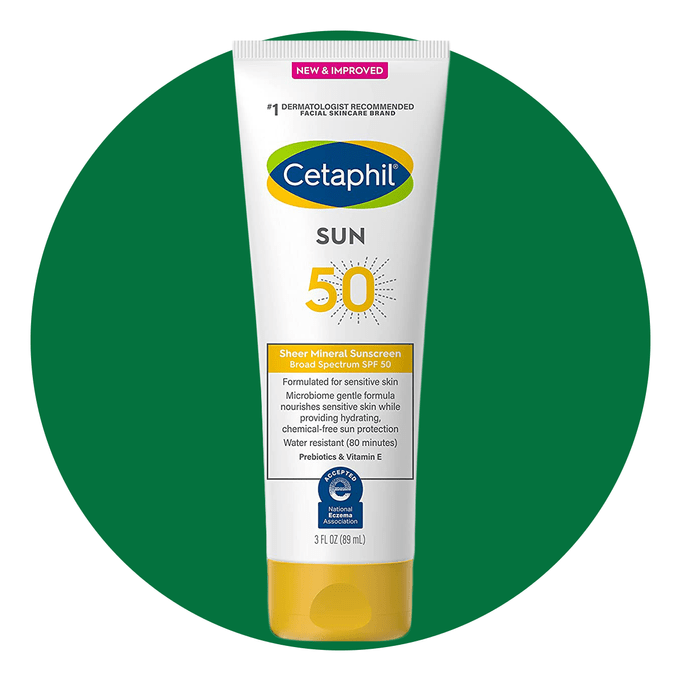
This CETAPHIL sunscreen uses a combo of zinc oxide and titanium dioxide with prebiotics to nourish sensitive skin, while providing chemical-free sun protection.
It soothes skin using vitamin E, a powerful antioxidant that helps protect skin from free radicals.
La Roche-Posay Anthelios Mineral Ultra-Light SPF 50
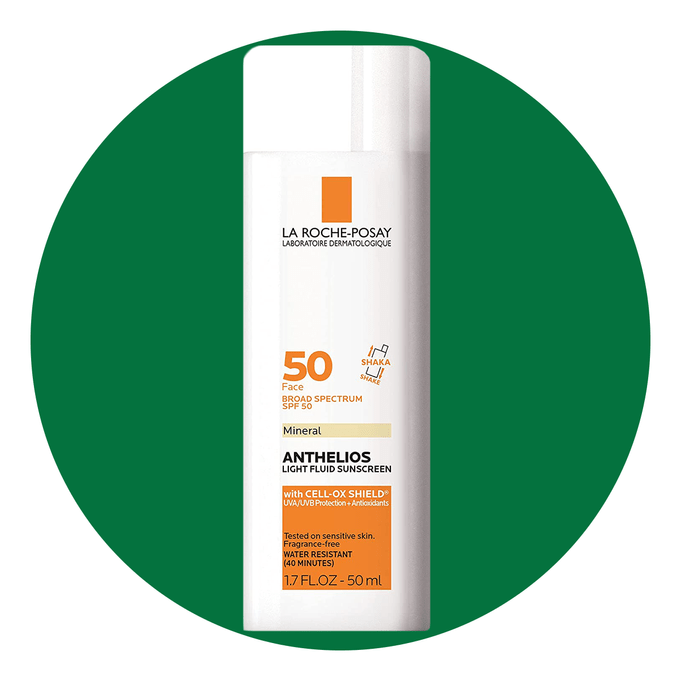
Zinc oxide and titanium dioxide are the active ingredients in La Roche-Posay sunscreen, which combines powerful antioxidants and broad-spectrum coverage to shield skin from free radicals and harmful UV rays. This sunscreen is hypoallergenic, oil-free, fragrance-free, and free from harsh chemicals like oxybenzone.
Dermatology Pros Just Listed Their 6 Favorite Vitamin C Serums
Alba Botanica Hawaiian Sunscreen Lotion SPF 30
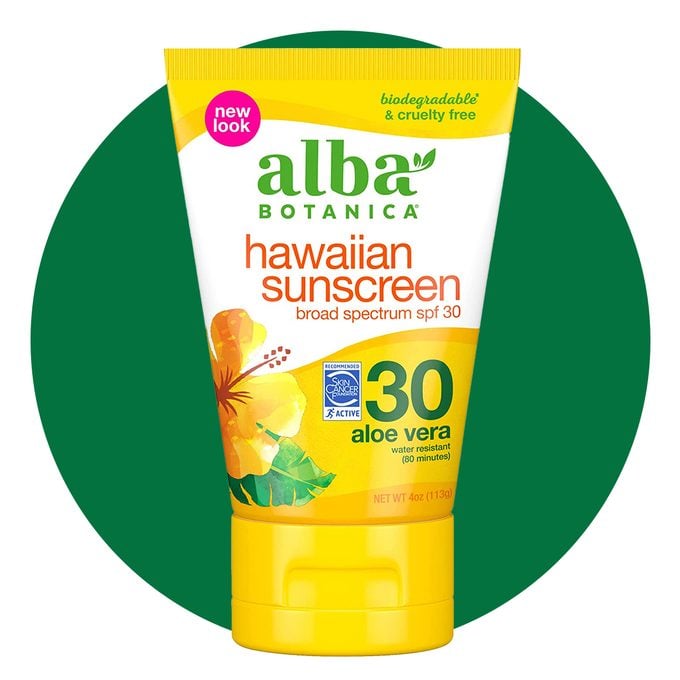
Formulated free of oxybenzone, octinoxate, and gluten, Alba Botanica sunscreen is also hypoallergenic, fragrance-free, vegan, and reef-friendly. This plant-based formula contains no parabens, phthalates, or sulfates and uses 100% vegetarian ingredients. It’s also a recommended product by the Skin Cancer Foundation.
Dr. Cates says this product is her favorite pick on this list and she would recommend it.
Badger SPF 30 Active Mineral Sunscreen Cream
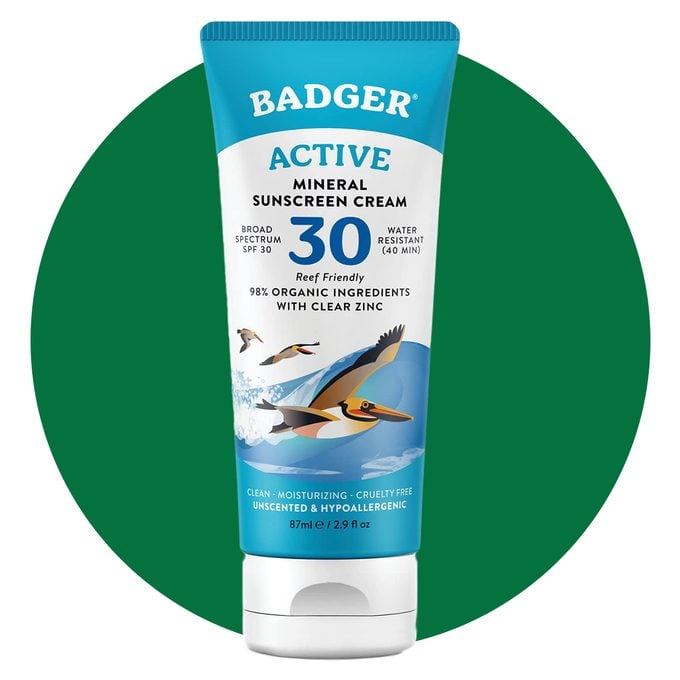
Both Dr. Parrish and Dr. Cates recommend Badger sunscreens, which use mineral-based, non-nano zinc oxide as the active ingredient. This product is also GMO-free, rich in antioxidants, and contains 98% organic ingredients.
For the sustainability-minded, this Badger sunscreen is also reef-friendly and made using solar power.
The 8 Reef-Safe Sunscreens Dermatologists Love
Babo Botanicals Zinc Sunscreen Lotion SPF 30
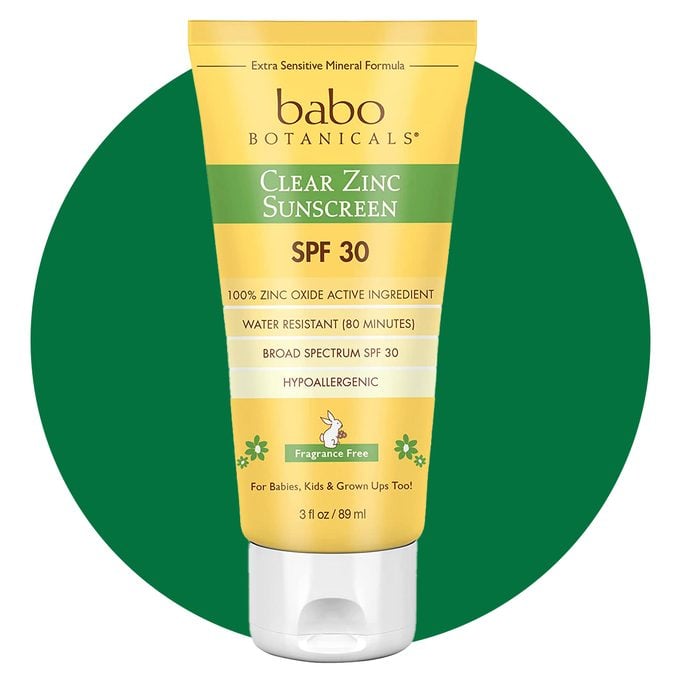
Dr. Parrish says Babo Botanicals sunscreens offer mineral-based sunscreens that are free from synthetic fragrances and other harmful chemicals and use non-nano zinc oxide as their active ingredient. As an added bonus, this product is formulated for sensitive skin, goes on clear, is lightweight, and fast-absorbing.
BLUE LIZARD Sensitive Mineral Sunscreen with Zinc Oxide, SPF 50+
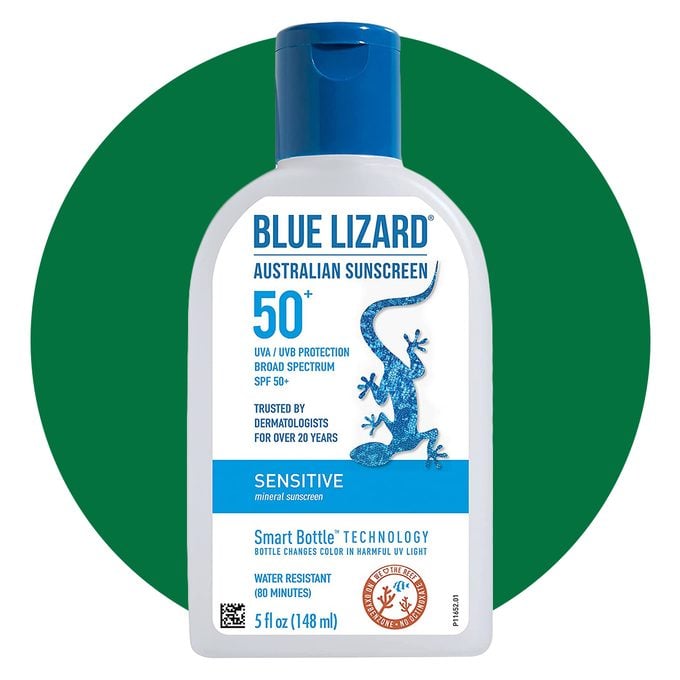
Several healthcare experts told us that Blue Lizard sunscreens are generally hormone-safe, using the active ingredients non-nano zinc oxide and titanium dioxide. This product also offers high SPF protection, is free from fragrances and parabens, and is water and sweat resistant for up to 80 minutes—which is longer than many sunscreens.
Get The Healthy’s daily newsletter and follow us on Facebook, Instagram, and Twitter. Keep reading:


















